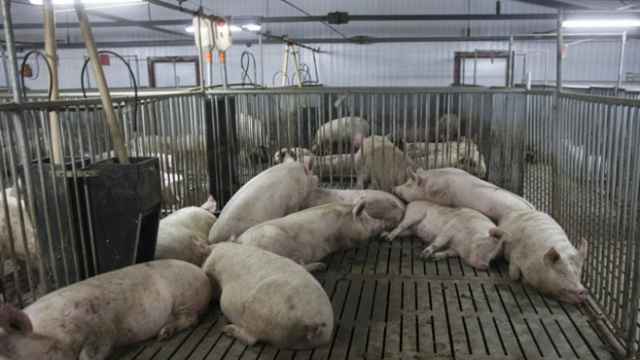Exporters of Russian wheat have cut prices to try to speed up sales abroad before the government possibly introduces curbs to replenish its own stocks and prevent rises in the cost of bread, traders and analysts said on Friday.
Russia's grain exports are running at a record high, buoyed by a large crop and a sinking ruble which after dropping 40 percent this year against the dollar has made exports more profitable than domestic sales.
On Thursday, Agriculture Minister Nikolai Fyodorov told an agriculture commission in the lower house of parliament that his ministry would consider all options to restrain exports, "except an embargo," and cover domestic demand.
President Vladimir Putin's popularity has been largely based on him bringing stability after the chaos caused by the fall of the Soviet Union, and officials are mindful of preventing social discontent as the economy weakens and inflation spikes.
The Kommersant newspaper quoted bread producers and shops on Thursday as saying bread prices may rise 10 percent in the near future due to rising prices for flour, grain, sugar, raw materials and other higher costs.
Russia cannot ban exports as it did after a drought in 2010 as it is now a member of the World Trade Organization, analysts say, but Fyodorov's comments have confirmed that the government still has tools in hand to curb sales.
Earlier, officials said Russia may consider imposing a floating tariff as a measure of last resort in 2015, while its food safety regulator may tighten export rules.
"Traders are worried about the decisions the government is going to make," a trader said. "Nobody wants to stay with expensive stock in hand."
Russia's Black Sea prices for wheat with 12.5 percent protein content are currently down $6 to $258 per ton on a free-on-board (FOB) basis compared with a week earlier, SovEcon agriculture consultancy said.
Russia, one of the world's key wheat exporters to North Africa and the Middle East, has harvested the second-largest crop in its post-Soviet history of 104 million tons this year.
With the annual domestic demand of 70 million tons, its grain exports will reach a record of 21 million tons in the first half of the 2014-15 marketing year, which started on July 1, according to SovEcon.
The Agriculture ministry is now discussing an increase in prices at which it buys grain on the domestic market for its 1.75 million tons of stocks, Fyodorov said. The current price of its so-called intervention program is too low to compete with exporters and domestic users.
A Message from The Moscow Times:
Dear readers,
We are facing unprecedented challenges. Russia's Prosecutor General's Office has designated The Moscow Times as an "undesirable" organization, criminalizing our work and putting our staff at risk of prosecution. This follows our earlier unjust labeling as a "foreign agent."
These actions are direct attempts to silence independent journalism in Russia. The authorities claim our work "discredits the decisions of the Russian leadership." We see things differently: we strive to provide accurate, unbiased reporting on Russia.
We, the journalists of The Moscow Times, refuse to be silenced. But to continue our work, we need your help.
Your support, no matter how small, makes a world of difference. If you can, please support us monthly starting from just $2. It's quick to set up, and every contribution makes a significant impact.
By supporting The Moscow Times, you're defending open, independent journalism in the face of repression. Thank you for standing with us.
Remind me later.





